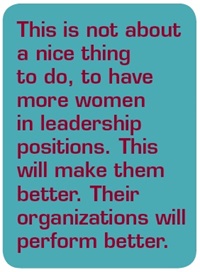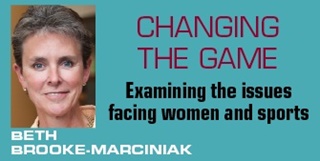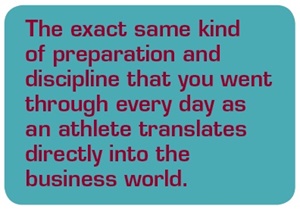S
ports has played a key role in the education and career development of Beth Brooke-Marciniak, global vice chair, public policy, at Ernst & Young. As a basketball player at Purdue University, Brooke-Marciniak learned discipline, teamwork and the pursuit of perfection. Today, through the creation in 2013 of the Women Athletes Business Network, she aims to help female athletes prepare for success in business. With an online community of more than 1,000 female athletes, the network is forming its second class of mentors and mentees. “The matches in the first class were phenomenal,” Brooke-Marciniak said. She spoke with SportsBusiness Journal Executive Editor Abraham D. Madkour about how former athletes can succeed in business and how sports business can become more diverse. The following excerpts have been edited for clarity and brevity.
■
What attributes do you feel a young woman obtains when she plays a sport, and do those attributes translate well into the workforce?
BROOKE-MARCINIAK:
Teamwork: They understand sometimes you lead and sometimes you follow. You have a role on the team. That translates very well in the work world. Preparation: You do not go unprepared. You don’t go in without having analyzed work. What plays are they going to make, what are they thinking, and what angle are they coming from in a negotiation? The exact same kind of preparation and discipline that you went through every day as an athlete translates directly into the business world. Over time, that just gets baked into your DNA. When I talk to my female colleagues, former athletes, you just hear them, and it’s in the way they approach things. It is their focus and their resilience. It is baked into them versus the non-athletes; it is not there.
■ In hiring, when a candidate has played sports, is that a good indicator for you?
BROOKE-MARCINIAK: A great indicator, and it never let me down. That doesn’t mean you can overlook their educational background and confidence, but I will take an athlete every day in the world over a non-athlete given that they have the basic confidence that I need. I know they have these skills, and it has never let me down. The athletes will do anything and will never stop. Failure is not an option. It is not in their DNA.
■ What was behind the Women Athletes Business Network, and how can sports become more diverse with more women in the executive ranks?
 |
Women athletes represent an “untapped pool of talent” for corporate leadership.
Photo by: GETTY IMAGES
|
BROOKE-MARCINIAK: We started the Women Athletes Business Network because what we saw was that there were not enough women in corporate leadership or on corporate boards. Similar to the issue that you are seeing in the sports industry, not enough women in sports leadership roles. So we looked at women athletes as an enormous untapped pool of talent. We have been trying to advance women in corporate leadership for years. One thing that we thought that had not been done was to recognize this untapped pool of leadership talent that existed in female athletes. We just started talking to female athletes and women in careers who used to be athletes. What we discovered was, women athletes hadn’t been role modeled or inspired to be anything but a coach or a broadcaster. That is a generalization; obviously some have. But most go on to work as broadcasters or as a coach because they have not been role modeled to think they can succeed in business. I also suspect that they have not been role modeled to think they can succeed in leadership positions in sports organizations either. You look and there are just not enough of them. So that is why we started the Women Athletes Business Network: to help former, previous, elite female athletes to succeed in business.
I wonder whether the sports organizations understand the business case, or why should they care? This is not about a nice thing to do, to have more women in leadership positions. This will make them better. Their organizations will perform better. We as a business really have to shift from treating women as victims, where we think, “Oh my gosh, we need to help them be in leadership.”
 |
We made a hard pivot to start talking about the economic business case. We really did that when we had a horrible financial crisis back in 2008. What we saw in the global financial crisis, you had a lot of homogeneous leadership at the top of the banks, running organizations right over the cliff. There just wasn’t enough diversity around the decision-making tables. We almost ran the financial world off a cliff. The economic case for more diversity was never more apparent than it was coming out of the global financial crisis. We really pivoted to stop talking about women as victims and start talking about women as economic engines to improve bottom-line performance, community performance and corporate performance. I do not think the sports organizations have taken that journey. You look at the diversity in leadership, and there isn’t much on any dimension.
■ How does that pipeline get developed, and what type of workplace policies can be put in place to speed up diversification?
BROOKE-MARCINIAK: There are plenty of women in the pipeline. Flexibility is important; it is important for many men and women. That is not just a women thing. Men need flexibility just as much. If you get more men working flexibly, they then start to help with the burden of the home, and it allows all men and women to be in the workforce in leadership positions. This is why it is important for both men and women.
Accountability: It has to be important to an organization. It has to be transparent. How many women do we have, at what level? Are they being promoted? You have to hold organizations and leadership teams accountable.
Mentorship is important. Sponsorship is important, and they are different things. You have to help mentor those women who are in the pipelines so that they can demystify the black box of leadership so it is not so mysterious. Then men and women have to sponsor women in the pipelines to take risk, to put them in positions of authority, and once sponsored in those positions, to help make sure they succeed. All too often, women will get promoted into something, and then the first thing to happen if they start to falter at all, instead of surrounding them like their male colleagues to help them succeed, they will surround the women like sharks and say, “I told you so. I knew she would fail.”
■ What advice do you give to women who are starting their careers in the business world?
BROOKE-MARCINIAK: Things in this world still get done based on the strength of the relationship that you have. The analogy here is like saving money early. You save your pennies when you are a kid, and then you are pretty wealthy when you are old because of the accumulative effect. The same thing is true with relationships. If you build them early based on what you can do for others, over your career and lifetime, you will end up with relationships galore with people who can help you. It comes back to you tenfold over the course of your life.
Whatever you are doing, whether you are an entrepreneur or in the corporate world, do anything that you are asked. Nothing is below you. Athletes know that. You do anything that is asked and you take risks. If you see something that needs to be done, go do it. If you are asked to do something and you don’t think you can perhaps do it, go do it. Do not worry about failing. You learn from experience and trying different things because you discover your strengths and passions. As a young person, that is the best thing you can do because when you are graduating college, chances are, you do not know your strengths and passions. It is only through diversity of experiences that you will actually figure it out. I think you will just have more of an interesting and rewarding set of careers.







